Cha Wa
Click  on photo to download high resolution version
on photo to download high resolution version
All rights reserved. Photos are for editorial use only.
Photos
Latest ReleaseView All
My People
Release date: 4.2.21
Label: Single Lock
Press Releases View All
Cha Wa Celebrates New Orleans Street Culture And The Mardi Gras Indians With A Fiery Tapestry Of The City’s Sounds On ‘My People’ (April 2 / Single Lock Records)
Read MoreBiography View
Joseph Boudreaux Jr., the lead vocalist for the Mardi Gras Indian funk band Cha Wa, can not even pinpoint his first experience with the Indian tradition. As the son of Big Chief Monk Boudreaux, he has been part of the deep-rooted New Orleans cultural phenomenon since before he could walk.
“On the street, I started at one year old, with my dad,” he said. “By the time I was nine or ten, I had started doing festivals.”
Cha Wa was founded in 2014 and releases its third album My People, the follow-up to 2018’s Grammy-nominated Spyboy and its first for Single Lock Records, on April 2nd – but its true history goes back, in a strong sense, far further. The first documented record of Mardi Gras Indians in New Orleans dates back to the late 19th century. These were African-American men and women who roamed the city streets on Fat Tuesday morning and St. Joseph’s Night in celebratory groups, playing handheld percussion like glass bottles, tambourines and cowbells, and shouting and chanting in a unique dialect that scholars have tried to explain the roots of, but never quite agreed on. “Cha Wa”, the band’s name, is a traditional Mardi Gras Indian shout; so is “jock-a-mo-fee-nah-nay”, familiar to music fans, of course, from the enduring tune “Iko Iko.” Some suggest that Indian phrases can be traced to Native American languages, which would make sense – the most accepted origin story for the culture is that it was meant to pay tribute, in song and spirit, to the Native groups that gave shelter to black New Orleanians fleeing enslavement.
My People is Cha Wa’s first project with Single Lock, the respected Muscle Shoals and New Orleans based label whose roster has always been simpatico with that vibe, teasing out the threads and throughlines of creative tradition in Southern music, from legendary veterans like Donnie Fritts and the Blind Boys of Alabama to young torchbearers like Cedric Burnside and St. Paul and the Broken Bones, drawing a map of Southern music – and the South’s – diverse identity. The sweeping palette of unmistakably New Orleans sound on My People fits beautifully into that mission. Some of the songs are deliberately, powerfully organic and raw, like the raucous closer “Shallow Water” – a traditional Call and Response tune that was recorded live at the storied Indian barroom Handa Wanda’s in, founder and drummer Joe Gelini said, under an hour as the first take. Others embrace sounds of more recent vintage, like the fierce, taut title track, powered by industrial-strength horns, or the playful, swirling organ on “Bow Down.” The shivering piano that introduces “Morning Glory,” punctuated by yelps and drum slaps, is a taste of Dr. John’s own Mardi Gras Indian-tinged ‘60s psychedelia; “Love in Your Heart,” is a swellingly gorgeous slice of vintage, romantic soul powered by Angelika “Jelly” Joseph’s passionate vocals. Throughout, there’s plenty of propulsive, syncopated second-line rhythm, joyful shouts and Indian swagger – it’s an album as unstoppable, alive, and multi-voiced as a parade moving through the streets.
The clattering, hollering song of Indians on the move is primal and powerful. There’s a feeling that you’re somehow witnessing a deeper, stronger spirit breaking through the structures that govern city life, and the only thing more arresting than the sound is the sight of it: the Indians wear towering, elaborate suits that require months’ worth of work, topped with billowing ostrich plumes in riotous colors and festooned with painstakingly hand-beaded patches and panels that glitter in the sun or under streetlights: Some of the beadwork art might be Native American or African imagery, in homage to the culture’s roots, and some might depict images from an Indian’s own community, or personal life.
The Mardi Gras Indian sound had crept into broader culture already in pop and R&B form with 1950s and ‘60s hits like “Iko Iko.” The first time the greater public really got a at look at what Indians were about, though, was on the covers of two funky 1970s releases from the Wild Magnolias, which featured Monk Boudreaux: the first a close-up of a beaded and bejeweled patch, the second featuring the band fully suited up, blazing with color like a gang of extraordinary birds. These albums, which melded the traditional percussion and chants with slick, gritty and electric New Orleans funk, began a new chapter in the Indian tradition. Cha Wa bears that torch today, and also expands its horizons: the music on My People is a collage of multiple New Orleans sounds, from second-line brass to hip-hop to smooth soul music. That is, after all, how Southern stories get told – passed down through the years, acknowledging history as each generation adds its own part of the tale. And as a band, Cha Wa itself is that kind of multiple thing, with native New Orleanians like Boudreaux alongside new transplants like Gelini and guitarist/musical director Ari Teitel, and elders alongside young artists like recent college graduate Aurelien Barnes, the trumpeter and percussionist who sings lead on the title track “My People,” which he co-wrote with keyboardist Andriu Yanovski. The son of musician and educator Bruce “Sunpie” Barnes, Aurelien – like Boudreaux – grew up surrounded by New Orleans folkways, then studied formally with local jazz legends like Edward “Kidd” Jordan and Harold Battiste’s protégé Jesse McBride. “We’re bringing together different parts of New Orleans culture that are related, but aren’t the same,” Barnes said.
Joe Gelini was first captured by the sound of ‘70s New Orleans funk, the Meters and the Neville Brothers, in high school. “My mind was blown by that New Orleans style of drumming, all those incredible rhythms,” he said. Later, as a student at the Berklee College of Music, he had the chance to take a lesson from the great New Orleans drummer Idris Muhammad. “And I had this moment of clarity – he said, all these rhythms we’re playing are based on Mardi Gras Indians.”
After graduating, Gelini moved to New Orleans and made himself a student of the sound. He was such an apt one that he quickly began playing with Monk, soaking in the rhythm and the culture both onstage and at more informal neighborhood practices, as well as out in the streets. “I felt like such a guest of the culture, and I also felt like family,” he said.
New Orleans culture exists uniquely in time. It treats its musical history with reverence: origins a century old, or more, are always audible in the sounds that define it, from jazz to brass-band to Indian music. Yet it constantly welcomes new growth, too – funk and hip-hop and contemporary R&B meld easily with all of its venerated sonic traditions, keeping the city’s singular culture vital, vivid and honest.
My People is the latest in the catalog of a young band that has always typified this essential part of the character of America’s most interesting musical city. It sounds like New Orleans today. “With New Orleans music, you have to keep the traditions, it’s rooted in tradition,” explained Joseph Boudreaux. “You add your originality, and connect to those roots.”
“We try to take the influence of Monk and Bo and Willie Tee [from the original Wild Magnolias] back in the day, when they were interpreting the music of their time – the deep funk, disco, Afrobeat and tinges of reggae,” said Gelini. “And we’re also trying to interpret and write new music that we’re inspired to play that’s relevant to our generation, and our current social environment.”
With regard to the latter, a chilling cover of Bob Dylan’s “Masters of War,” fronted by guest Alvin “Youngblood” Hart and textured by its African-influenced arrangement, stands out as a timely statement of protest. But at its core, the Mardi Gras Indian tradition itself is as much defiant one as it is a celebratory one. For Black people, like the first Indians, to take to the streets in a display of beauty and power was dangerous a hundred years ago; it still is, of course, today. To take joy in their own loud voices and physical glory – crowned in feathers and jewels - is its own certain kind of protest. My People feels like pure joy, a distillation of generations of New Orleans expression, but it also never fails to remind us how hard-won that joy was and still is: not least in the tense, funky and explosive title track, with its declaration “My people, we’re still here.”
“Mardi Gras Indian songs are inherently songs about freedom,” Joe Gelini said. “And that struggle is as relevant today as it’s ever been.”

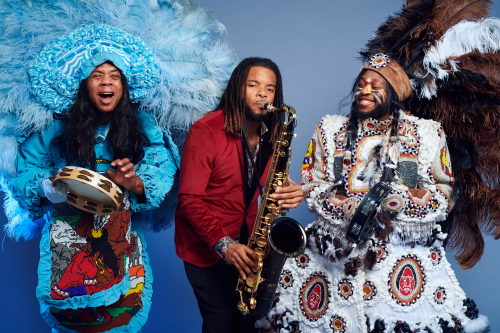
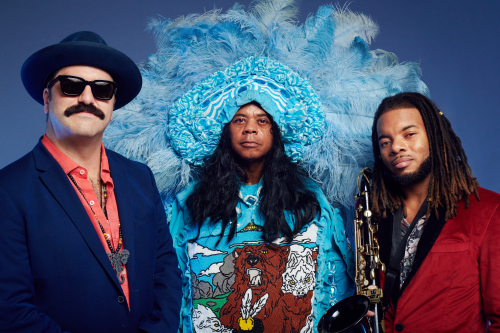
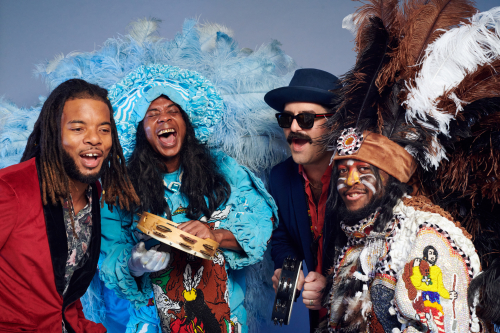
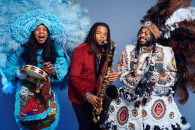
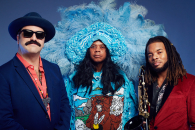
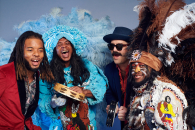
_400_400_s_c1.jpg)